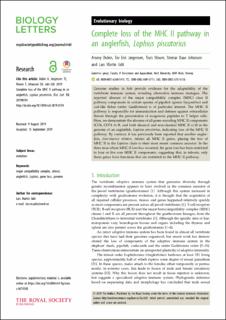Complete loss of the MHC II pathway in an anglerfish, Lophius piscatorius
Peer reviewed, Journal article
Published version

Åpne
Permanent lenke
https://hdl.handle.net/11250/2658241Utgivelsesdato
2019Metadata
Vis full innførselSamlinger
Originalversjon
Dubin, A., Jørgensen, T. E., Moum, T. B., Johansen, S. D. & Jakt, L. M. (2019). Complete loss of the MHC II pathway in an anglerfish, Lophius piscatorius. Biology Letters, 15(10). doi: 10.1098/rsbl.2019.0594Sammendrag
Genome studies in fish provide evidence for the adaptability of the vertebrate immune system, revealing alternative immune strategies. The reported absence of the major compatibility complex (MHC) class II pathway components in certain species of pipefish (genus Syngnathus) and cod-like fishes (order Gadiformes) is of particular interest. The MHC II pathway is responsible for immunization and defence against extracellular threats through the presentation of exogenous peptides to T helper cells. Here, we demonstrate the absence of all genes encoding MHC II components (CD4, CD74 A/B, and both classical and non-classical MHC II α/β) in the genome of an anglerfish, Lophius piscatorius, indicating loss of the MHC II pathway. By contrast, it has previously been reported that another anglerfish, Antennarius striatus, retains all MHC II genes, placing the loss of MHC II in the Lophius clade to their most recent common ancestor. In the three taxa where MHC II loss has occurred, the gene loss has been restricted to four or five core MHC II components, suggesting that, in teleosts, only these genes have functions that are restricted to the MHC II pathway.
